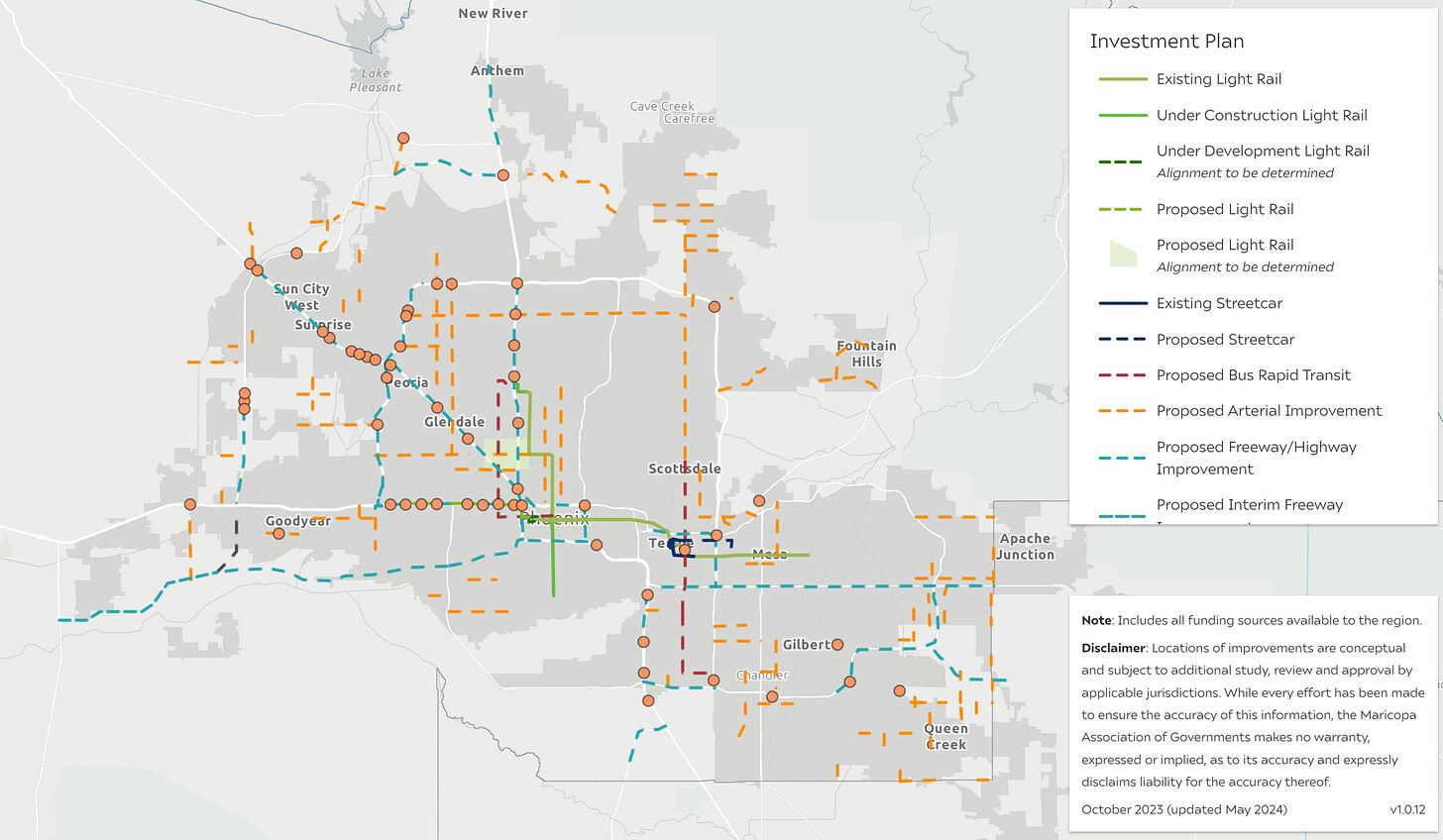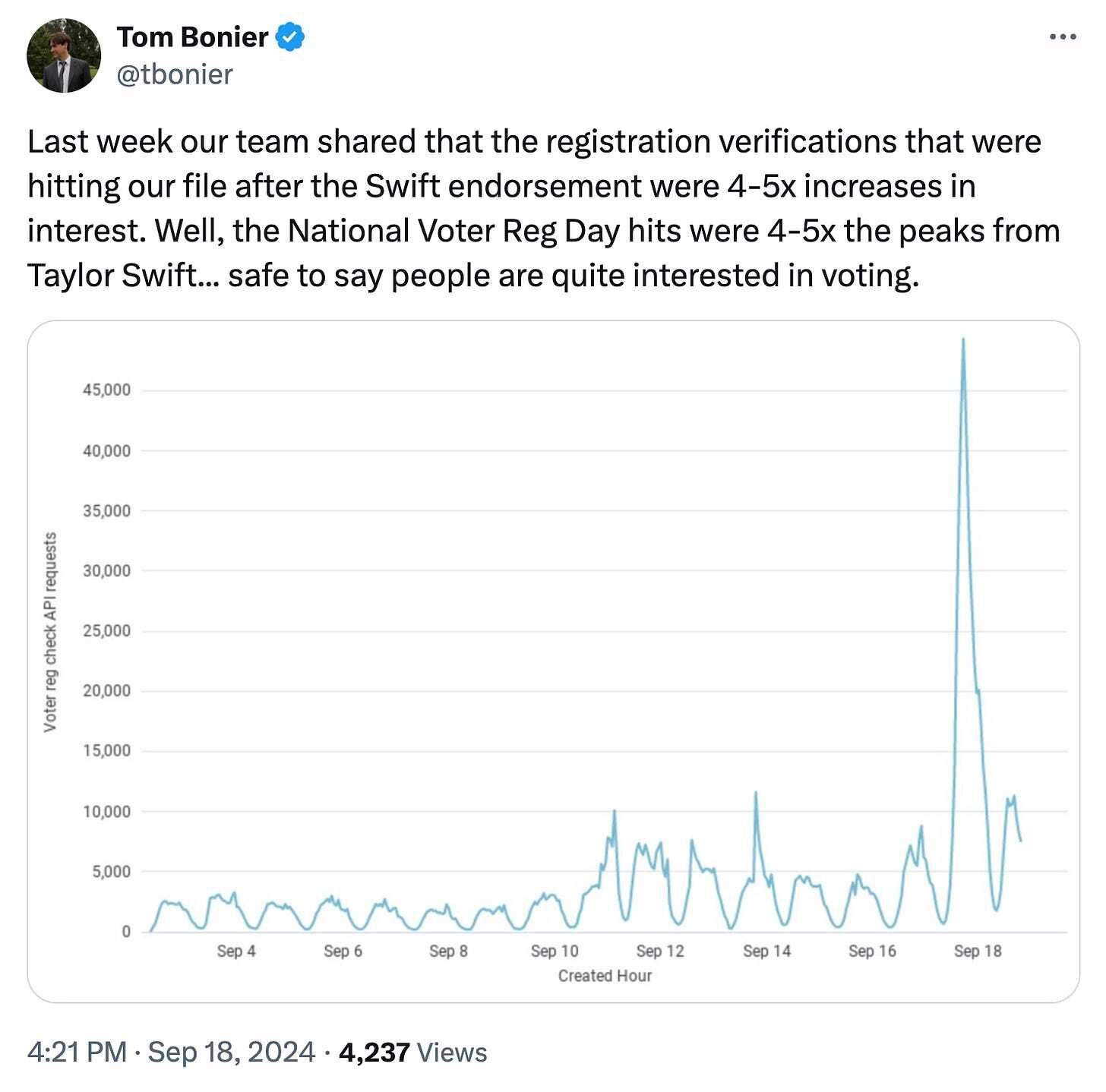We’ve told you about the 13 statewide propositions that every voter will be asked about on their insanely long November 5th ballot.
But for most voters, there will be a lot more than 13 propositions.
Depending on where you live, there are scores of small governmental districts that may add questions to your ballot — be that school districts bonds or overrides, city taxing questions, rural fire districts seeking tax levy adjustments, or local water districts seeking bonds.
However, one local issue stands out for its potential to impact the entire state: Maricopa County’s Proposition 479.
In simple terms, Prop 479 is a continuation of a half-cent countywide sales tax to fund transportation infrastructure. If voters approve it in November, Prop 479 will collect about $15 billion over 20 years, making up the largest chunk of county infrastructure spending by far.

The tax is an extension of Prop 400, which has been in place in one form or another for nearly 40 years,1 and has been essential in supporting the Valley’s transformation into a thriving metropolis.
Without it, the Valley’s infrastructure would resemble Tucson’s, or worse, as we wrote last year when lawmakers were wrangling with whether to allow voters to extend the tax:2
Can you imagine the traffic in the Valley if we didn’t have the 101, the 202 or the 303? What would Downtown Phoenix be without the Light Rail? Or downtown Mesa, for that matter? And that’s not to mention the hundreds or thousands of road-building and widening projects Prop 400 has paid for in its nearly 40-year history.
Or forget the traffic problem: Would the Valley as we know it even exist today if not for the roads to connect the many metropolitan areas? Would any major corporation want to move its headquarters to a place with bad roads and no freeways? Probably not.
And as rural lawmakers noted, the ripple effect of killing Prop 400 would reach far beyond Phoenix. Without Prop 400, every municipality in the state would have been pitted against the behemoth Maricopa County and its major cities in the race for limited federal transportation dollars.
The new Prop 479 was a hard-fought compromise between lawmakers and Gov. Katie Hobbs, who kept last year’s legislative session open for a record length as the two sides bickered over what should and should not be included in the plan.3
But it wasn’t the greatest deal ever struck — at least if you like public transportation and other methods of moving around the Valley that don’t involve driving a car.
Among its flaws:
The new Prop 479 would divert more money to highways and surface roads and less for public transit.
The tax cannot pay for any new Light Rail expansion.4
It bars any funds from being used to implement “road diets.”
The plan also prohibits any public funding, not just Prop 400 funds, from being used to put a Light Rail stop near the state Capitol.
That’s because Republican lawmakers were outraged at the idea of putting a stop next to the state House.
And it stops cities from outlawing the sale of gas cars, which as far as we know, no city was planning to do.
Still, Prop 479 would fund critical infrastructure projects that the county desperately needs to keep up with the rapidly growing population.

A wide array of folks from across the political spectrum back Prop 479, from the chambers of commerce to progressive city leaders. The opposition is basically the Free Enterprise Club and Freedom Caucus Republicans, with a smattering of progressives angry about the lack of Light Rail construction funding mixed in.
Early polling suggests the proposition is a slam dunk with voters, even among tax-averse Republicans.
And in these divided times, we’re taking some solace in the belief that when it comes to Prop 479, it seems Republicans and Democrats can at least agree to do one of the most basic functions of government: keep building roads.

Plot twist: Republican Maricopa County Supervisor Jack Sellers is endorsing a Democrat to take his place after he lost his re-election bid in the primary, KJZZ’s Wayne Schutsky reports. Sellers wants Democrat Joel Navarro to represent District 1 in the southeast Valley instead of Republican Mark Stewart because Navarro is “willing to stand up against lies and misinformation in defense of Maricopa County voters.” The endorsement could help secure a Democratic majority on the board, which is currently 4-1 Republicans with two seats potentially in play this November.
No more sportball?: Maricopa County and the Arizona Diamondbacks yesterday ratcheted up their years-long fight over who should pay to renovate and upgrade the stadium that taxpayers mostly paid to build for the team 20 years ago, further putting in doubt whether the team will ultimately stay in Arizona until or after its lease ends in 2027. The Republic’s Sasha Hupka and team break down the latest war of letters and words after the county sent an offer that the team called "simply not a serious or logical proposal.” Among other concessions, the team wants the same sweetheart deal the Cardinals got where they don’t pay state sales or income taxes and instead get to keep all that money to pay for upgrades to the stadium.
Musk is at the door: The pro-Trump America PAC, founded by Elon Musk, hired a new canvassing firm in hopes of vastly increasing the number of doors it will knock on in Arizona and Nevada, the New York Times reports. Federal filings show the group spent $36 million to help Republicans over the last month, and the wealthiest man in the world plans to donate $180 million to keep backing Donald Trump.
Behind the podium: Six attendees of Trump’s Tucson rally reported experiencing eye injuries after the event, and one of them told KVOA’s Chorus Nylander she was nearly blind the morning after the rally. All of them were seated behind Trump, and the former president’s team said they’re “collecting information.”
“It was all focused on my eyes, my eyes were red like hell you know, it's unbearable. I couldn’t handle it,” another attendee said.
Campaigning with kids: Arizona Attorney General Kris Mayes issued a legal opinion stating Arizona candidates can use their campaign funds to pay for childcare services while they're campaigning after four state legislators (who are also mothers) asked her to weigh in, the Arizona Mirror’s Caitlin Sievers writes. Federal candidates have been able to use campaign funds for child care since 2018.

Shifts and grifts: A five-month streak of decreased encounters along the southwest border broke in August, which saw a 3% increase from July, the Republic’s Raphael Romero Ruiz reports. The figures are still much lower than Border Patrol arrests last year. Meanwhile, Republican groups spent more than $37 million on anti-immigrant ads in swing and border states throughout July, bringing the annual tab to $117 million, per Capital & Mains. While the GOP has pushed its hardline immigration stance before, the new messaging criticizes Vice President Kamala Harris as a failed “border czar.”
That’s just Frank being frank: Benson police are investigating an LD19 Republican Committee meeting after some attendees alleged Frank Antenori, a former state lawmaker and Republican candidate for the Cochise County Board of Supervisors, started screaming at members “in a very threatening and intimidating manner,” the Herald/Review’s Terri Jo Neff reports. Another Republican PC said Antenori approached him, refused to back away and moved his right hand to his side where he had a firearm. Antenori denied the claims and attributed them to retaliation.
Unleash the free speech: Surprise’s City Council voted to repeal a rule that bars public speakers from criticizing city employees at meetings, Haley Williams writes for 12News. A woman was arrested for complaining about a raise for the city manager in August, causing a barrage of litigation against the city and a request from Sen. John Kavanagh that Mayes investigate the policy.

Tick-tock: Arizona school districts are running out of time to spend $432 million in COVID relief dollars federal guidelines say they have to spend by the end of the year, per KTAR. Cities are in the same boat, as we noted recently.
“Most (districts and charters) are showing the ability to do this, but a number of them are at great risk of reverting funds,” Superintendent of Public Instruction Tom Horne said in a press release.
Crisis averted: The Navajo Nation unanimously passed a six-month emergency budget ahead of the October deadline to stave off a potential government shutdown, the Navajo Times’ Donovan Quintero writes. The sprint to re-budget became necessary after the Navajo Attorney General declared the previous budget process was done wrong. Navajo President Buu Nygren indicated he would sign it.

Casa Grande Union High School District Superintendent Jeff Lavender turned off the cameras for a livestream of a board meeting after two board members showed up wearing red hats that said “MEGA: Make Education Great Again,” the Casa Grande Dispatch’s Jodie Newell reports.
Lavender said he shut down the cameras because “the school district cannot use resources in an attempt to influence elections.”
The two members didn’t remove their hats as the meeting was streamed in audio-only, and they later said the hats were not political. Ironically, the MEGA hats displayed the name of a mega PAC that supports conservative school board candidates.

